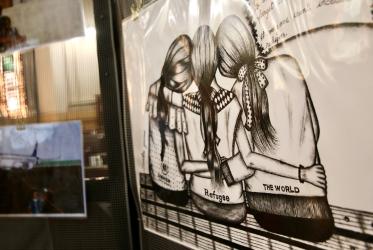By Xanthi Morfi *
The UN refugee agency, UNHCR, revealed in October that at the end of 2016 the number of people displaced from their homes due to conflict and persecution was a record 65.6 million, with 22.5 million of them refugees.
Refugees are only a part of global migration and although there is an important legal distinction between migrants and refugees, who are forced to move, they are all people on the move.
Many of the people on the move to Europe come from Africa and African migrants play a big part in the work of the Brussels-based Churches Commission on Migrants in Europe (CCME) does for them.
The discourse in the mass media can create the impression that increasing numbers of people from Africa and the Middle East are streaming into Europe on boats, but the number is falling in 2017. And, also many of the people on the move in Europe are Europeans.
The IOM, the UN Migration Agency, however, reported on 31 October that 149,785 migrants and refugees entered Europe by sea in 2017 up to 29 October. This compares with 334,914 arrivals across the region through the same period last year.
Still with the movement of people across and into Europe being such a hot-button issue politically and socially, church-based groups such as CCME have increasingly more and more work on their hands in helping shape policy on dealing with migrants and attitudes to them.
On the occasion of the launch anniversary of UNHCR's IBelong Campaign to end statelessness, 4 November, WCC interviewed Dr Torsten Moritz, executive secretary of CCME.
Q: Could you please introduce our readers to the work of Churches Commission for Migrants in Europe (CCME) and areas of work? What are your main goals?
Dr Moritz: CCME is an umbrella body for churches in currently 19 European countries which want to work together on questions of refugees and migrants, integration and anti-discrimination. The members are national churches – mainly Protestant and Orthodox – or Council of Churches.
The task of CCME is twofold: to be a platform of exchange and cooperation and to formulate and advance churches ‘position in the policy debate with the European institutions. As the mission statement says “CCME is an ecumenical organisation that serves the churches in their commitment to promote the vision of an inclusive community through advocating for an adequate policy for migrants, refugees and minority groups at European and national level. In the fulfilment of this mandate it is responding to the message of the Bible which insists on the dignity of every human being and to the understanding of unity as devoid of any distinction between strangers and natives”
Q: Why is statelessness an important issue in the European context, and particularly as it relates to the migration crisis that has been going on for the last years? (There is a general feeling among our European churches and church agencies that statelessness is a non-issue in Europe; how can we address that?)
Dr Moritz: Contrary to popular belief, statelessness is a pressing problem in several European countries: Europe was the place where two major incidents resulting in statelessness, namely the breakup of the Soviet Union and later the breakup and succession wars of former Yugoslavia.
Traditional discrimination of the continent´s biggest ethnic minority, the Roma, has also contributed to substantial numbers of persons being stateless. In addition there is a risk that the arrival of refugees from countries in the Middle East where statelessness is often a reality will create additional incidents of statelessness on European soil.
Q: What are the possible connections between human trafficking and statelessness?
Dr Moritz: Connections are manifold. Of course, the fact that stateless persons normally do not have valid papers makes it very difficult for them to attain education, to get a regular protected job or a credit or own land for starting an own business. All this creates vulnerabilities, which can result in being trafficked. Stateless people in these areas rely on the facilitation of dubious, often criminal middlemen and are as a result exposed to high risks for their life and freedom.
Stateless people often due have little resources and savings and thus have little chances to cope when crisis hits – this leads to a willingness to take risks. This can for example be accepting smuggling as a way of migrating – a practice obviously likely to impact on the well-being, the life and integrity of a person.
Q: What could be the role of churches in Europe – and particularly CCME – in dealing with statelessness as an issue?
Dr Moritz: Churches can in some countries play a very practical role when it comes to individual cases of trying to get out of statelessness. The fact that churches keep records of life event – baptisms, marriages, in some countries birth, can be enormously helpful if evidence for the existence and identity of a person is needed.
On a more structural level, churches could in the communities assist and encourage that births are recorded and that marginalised group have access to the documents provided by the state, thus reducing one factor of statelessness. On both national and European level churches can and should advocate for legislation that allows for the mapping of and overcoming of statelessness.
CCME as a European umbrella has and will continue to make sure that churches are informed and mobilised around the issue. This means using churches specific role but also efforts to include churches in activities of UN agencies or NGOs. For that reason CCME recently became member of the European Network on Statelessness.
Q: How can churches build on the Berlin Conference on statelessness and contribute to the UNHCR IBelong Campaign, as part of the Pilgrimage of justice and Peace?
Dr Moritz: I think the Berlin conference as well as an earlier WCC sponsored event in Den Dolder have shown that churches are beginning to care about the issue. WCC and partners have developed and collected an amazing amount of written and video-based resources which make it fairly easy for churches to get started on the work. There are broad coalitions in place in many countries around the IBelong campaign and churches have a strong role to play in these partnerships. We have in Berlin heard clear signals that UN agencies and NGOs keep the doors very open for churches´ cooperation.
As the materials show statelessness is one of the harshest injustices of our days with wide-reaching consequences for those concerned. I am thus fully convinced that it is a central justice issue and therefore rightly features in the pilgrimage.
* Xanthi Morfi, WCC communication officer.
WCC advocacy work on the rights of stateless people







